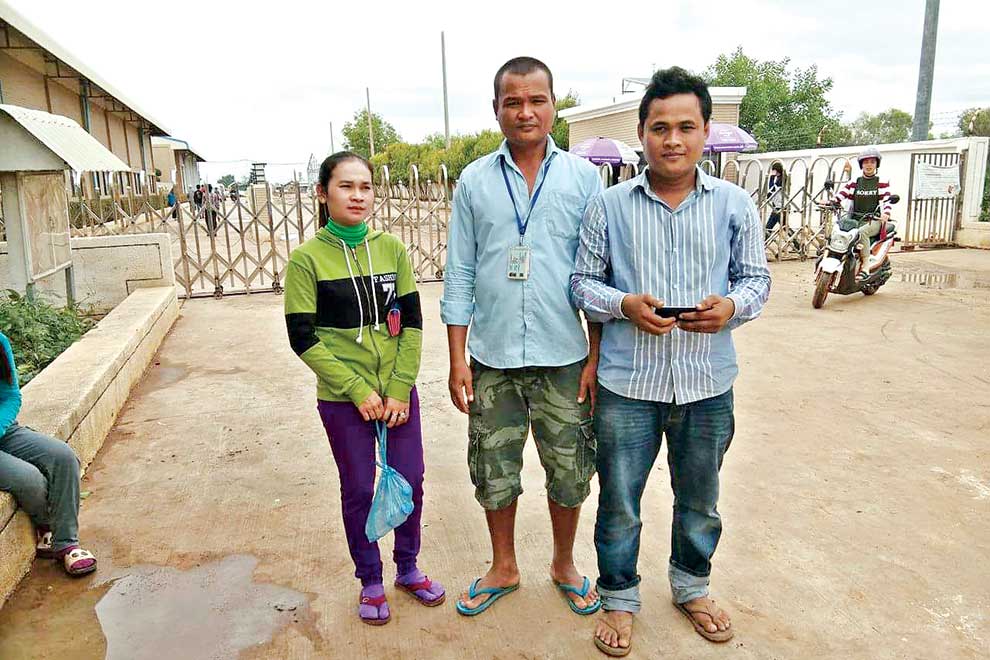
Garment worker Morn Dy (left) and machine repairer Peng Phalla (right) in front of Sun Hsu factory in Kampong Cham. Dy and Phalla say they are among several workers who were fired for trying to start a union there. Photo supplied
For Peng Phalla, a sewing machine repairman by trade, the beginning of the end was December 8 – the day he filed the paperwork to form a union.
Phalla had spent the past two years helping a factory in Kampong Cham province churn out baby clothes. Now he wanted to improve working conditions for himself and his colleagues. Instead, he said, factory managers “started observing all my activities in the factory”.
First, the factory accused him of sexually harassing workers, “but the workers supported me”, according to Phalla.
Then, he said, a factory administrator dropped by unannounced at the snack shop where his wife worked and asked her if she was aware of her husband’s activities.
A few days later, the commune police chief showed up at Phalla’s parents’ house and told them that their son would lose his job if he didn’t stop his union work.
On December 28, less than three weeks after submitting the paperwork to form a union, Phalla says he was called into the office and fired.
Phalla is not alone. He is one of at least four workers who have accused managers at Chinese-owned Sun Hsu Garment Co Ltd of using their influence inside and outside of the company to harass, coerce and prevent employees from forming a union.
A representative of Sun Hsu factory who answered the phone yesterday said he was in a meeting and asked to speak to a native Khmer speaker. He did not answer subsequent calls.
The factory, which employs roughly 1,700 workers, makes children’s clothes for American brands The Children’s Place and Carter’s.
Morn Dy, a co-worker and secretary for Phalla’s ill-fated union, said factory managers also tried to pressure her into resigning from the union by telling her that Phalla had already taken a payout and quit his job.
When that didn’t work, she said, the commune police chief also paid a visit to her parents’ house.
“My father was so scared of this, he asked me to stop,” Dy said. “And I agreed with them. I went back to the factory and the administrative manager gave me the form to resign from union.”
However, in late February, a manager called Dy into the office and informed her that her contract was not being renewed.
“I only want my job back and to continue my union activities,” she said. “The union did not do anything wrong . . . We had no plans to shake up the factory. We wanted to help the factory have good collaboration with workers and to comply with the law.”
Chheang Heang, the head of the Kampong Cham Labour Department, said officials were in the process of investigating the case.
Heang said he was “not sure” yet if the workers had really been threatened by police. However, he insisted that claims that the factory had discriminated against the workers due to their involvement in the union were untrue.
“It is not true because we strongly enforce the Trade Union Law,” Heang said. “If they respect that and follow it, it should not be a problem.”
Both the Cambodian Constitution and the Labour Law give citizens the right to form and become members of trade unions. Based on the law, employers are ostensibly prohibited from discriminating against workers on the basis of their participation in a union.
However, union leaders have noted an increase in harassment, prosecution and discrimination since the passage of the widely criticised Trade Union Law in 2016. Unions and labour rights advocates have called it a thinly veiled attempt to saddle unions with onerous regulations, and to limit their ability to advocate on behalf of workers.
Mom Seak, the national head of the Khmer Union Federation of Workers Spirit, said he filed a complaint with the Ministry of Labour about the situation at Sun Hsu factory but had “little hope”, noting that workers were afraid to support the union.
There aren’t many opportunities in the provinces, Seak said, adding that if workers “lose their job, they can’t stay home and work close to their home, so they don’t join and just keep silent and stay away from the union”.
Solidarity Center senior program officer Khun Tharo expressed alarm about the accusations and said it was particularly inappropriate for factory managers and police to approach workers’ relatives. “This is really a threat to workers and to those elected officers,” Tharo said. “Workers have their rights. They should file this complaint. It’s really anti-union discrimination.”
While shocking, the workers’ stories of harassment and persecution are unfortunately commonplace, said Coalition of Cambodian Apparel Workers Democratic Union President Ath Thorn.
He warned that local authorities will often try to mediate a compromise between the company and the workers by getting the company to offer the workers money in exchange for dropping their complaints.
“They try to lobby or persuade workers or their families to reconcile with the company,” Thorn said. “But they don’t teach the company to respect the law.”














